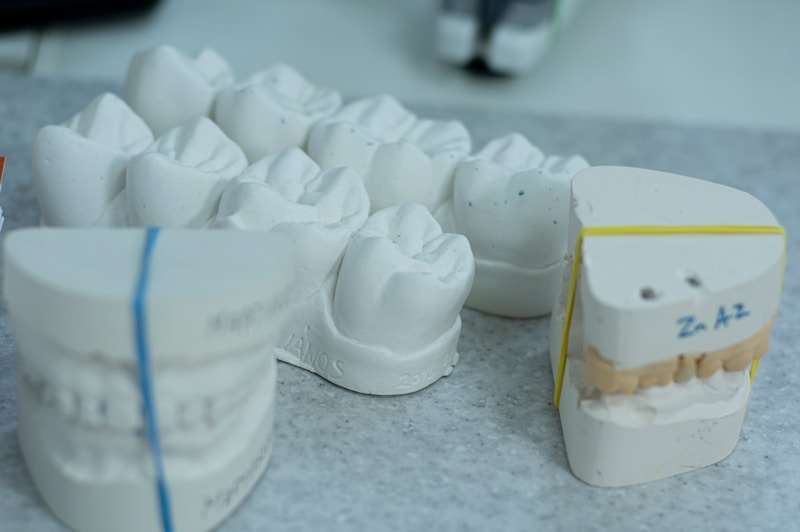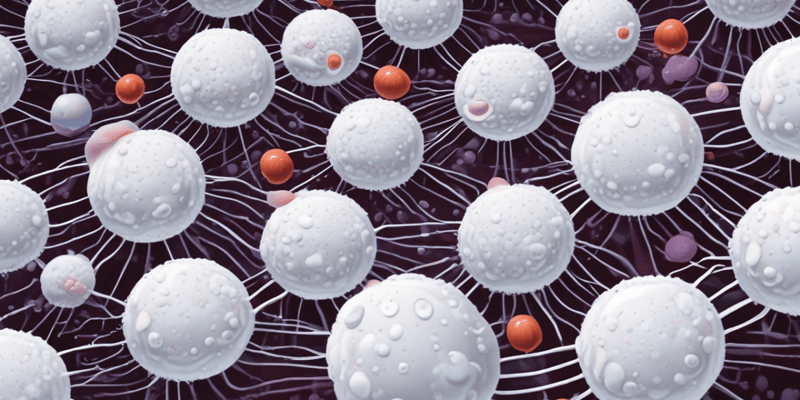Podcast
Questions and Answers
B Lymphocytes produce Antibodies which make the antigen recognizable to the immune system so it can be destroyed.
B Lymphocytes produce Antibodies which make the antigen recognizable to the immune system so it can be destroyed.
True
Interleukins, TNFα, prostaglandins, and bradykinin are all types of Granulocytes.
Interleukins, TNFα, prostaglandins, and bradykinin are all types of Granulocytes.
False
TH Cells are T cytotoxic cells that are primarily responsible for directly killing infected cells.
TH Cells are T cytotoxic cells that are primarily responsible for directly killing infected cells.
False
The immune system can differentiate between self and non-self antigens.
The immune system can differentiate between self and non-self antigens.
Signup and view all the answers
Both Non-specific (Innate) and Specific (Adaptive) immunity are types of acquired immunity.
Both Non-specific (Innate) and Specific (Adaptive) immunity are types of acquired immunity.
Signup and view all the answers
Opsonization refers to the process of making an antigen easily recognizable to the immune system.
Opsonization refers to the process of making an antigen easily recognizable to the immune system.
Signup and view all the answers
NK Cells are specifically designed to target and destroy bacterial pathogens.
NK Cells are specifically designed to target and destroy bacterial pathogens.
Signup and view all the answers
A state of resistance against infection from a particular pathogen is known as immunity.
A state of resistance against infection from a particular pathogen is known as immunity.
Signup and view all the answers
Agranulocytes include neutrophils, eosinophils, and basophils.
Agranulocytes include neutrophils, eosinophils, and basophils.
Signup and view all the answers
The inflammatory response is a key event in both Innate and Adaptive immunity.
The inflammatory response is a key event in both Innate and Adaptive immunity.
Signup and view all the answers
Study Notes
White Blood Cells
- White blood cells are also known as leukocytes
- There are 5,000-9,000 white blood cells per microliter of blood
- White blood cells are divided into two categories: Granulocytes and Agranulocytes
Granulocytes
- Granulocytes are a type of white blood cell that contains granules in their cytoplasm
- Granules contain enzymes and other chemicals that help the body fight infection
- Include: Neutrophils, eosinophils, basophils
Agranulocytes
- Agranulocytes are white blood cells that do not contain granules in their cytoplasm
- Include: Lymphocytes, monocytes
Lymphocytes
- Lymphocytes are a type of agranulocyte that plays a key role in the immune response
- Include: Natural Killer (NK) cells, B Cells, and T Cells
- NK cells are cytotoxic cells that kill virus-infected cells and tumor cells
- B cells produce antibodies
- Antibodies bind to antigens, marking them for destruction by the immune system
- This process is known as Opsonisation
- T cells include T helper (TH) cells, T cytotoxic (TC) cells, and T suppressor (TS) cells
- TH cells help activate other immune cells
- TC cells kill infected or cancerous cells
- TS cells suppress the immune response, preventing it from attacking healthy cells
The Immune System
- The Immune System provides two basic types of immunity: Non-specific (Innate) and Specific (Adaptive)
- Non-specific (Innate) immunity protects the body from a broad range of pathogens
- Specific (Adaptive) immunity provides a more targeted defense against specific pathogens
Non-Specific/Innate Immunity
- Innate immunity is the first line of defense against infection
- The body's innate defenses include:
- Skin
- Mucous membranes
- Phagocytic cells
- Natural killer cells
- Inflammation
- Fever
- Complement system
Studying That Suits You
Use AI to generate personalized quizzes and flashcards to suit your learning preferences.
Related Documents
Description
Explore the fascinating world of white blood cells, also known as leukocytes. This quiz covers the different types of white blood cells, including Granulocytes and Agranulocytes, and their roles in the immune response. Test your knowledge on how these cells help the body fight infections.




